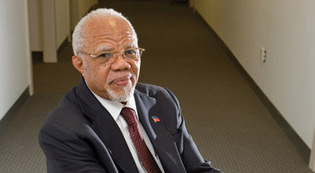 loading
loading
Where They Are NowWhere does Haiti go from here? ©Julie BrownFormer Haitian foreign minister Jean Renald Clerisme ’96PhD, photographed during a visit to Yale in 2008. View full imageBorn into a Haitian peasant family in the village of Chateau in 1937, Jean Rénald Clérismé ’96PhD earned his university degree in France and spent two decades as a Roman Catholic priest and an organizer of poor farmers. After earning his Yale doctorate in anthropology in 1996, he went on to represent Haiti in institutions including the World Trade Organization and the International Atomic Energy Agency. Clérismé served as Haiti’s minister of foreign affairs and religions from 2006 to 2008. Since then, he has advised President René Préval on Cuban-Haitian relations and agricultural development. Clérismé was not injured in the catastrophic earthquake of January 12. We were able to reach him by phone in late February. Y: Your office is in the National Palace, which was severely damaged. Were you in the palace when the earthquake struck? C: No, I was in a suburb to the east of Port-au-Prince, Petite Place Cazeau, at a meeting with university students, volunteers working in the mountains with peasants, and with UNDP [United Nations Development Programme] people. Y: Were your family members safe? C: My wife [Linda Marc ’92MPH] is fine. But a nephew, an artist, was injured. There was no possibility of medical assistance, and he lost so much of his blood that he died. Y: Our condolences. On a national level, what has been the worst thing about this earthquake? C: We have lost so many people. The last figure is 222,000, and we think we will have more than 250,000 people who died. That’s the worst thing that happened. The construction was not made with the technology to save lives. Now we have to rebuild the country, knowing that we are really vulnerable. Almost every day we have another aftershock. Y: What have been your responsibilities since the earthquake? C: I am coordinating the help of Cuban physicians. We are working on psychological support for children whose parents have died and who have to recover. There are thousands of them. Whenever we go to any camp, there are hundreds of orphaned children. Y: How many doctors have come from Cuba? C: There are 584 Cuban physicians and nurses, and the Cuban doctors have trained Haitian doctors and nurses at the Latin American School of Medicine in Cuba. Y: Some media reports have suggested that the Haitian government is absent from the recovery efforts. C: I think they have this impression because in the beginning everyone was really very disturbed. But by the next day, the government wanted to make a plan with those who had come to help, and the government has been working with them. Since we don’t have the resources at hand, we let those who intervene help. So if you are in the field, you don’t see the government. Y: Has any good come out of this disaster? C: I think something good is coming. First of all, there is Haitian solidarity, and the civil society and the government are more inclined to work together to rebuild the country. Second, people will pay attention to what the scientists say about construction. Y: Have these events changed you? C: We understand the weakness, the vulnerability, of everything in our lives. The destruction happened in less than 35 seconds. In such a few seconds we have lost so many people. Life is precious, but at the same time it’s very fragile. We have to pay attention to everything we have to do—each minute, each second, counts in human life. We don’t have control of everything that’s going on. You have to take everything seriously, but not in an absolute sense. Now I am more aware of the relativity of life. There are dogmatic people who want to think that what they think is absolutely right. I am a relativist in general, but after the earthquake I have a greater sense of the vanity and fragility of everything on this earth. Therefore, I find another reason to be humble. Y: What should be done to help Haiti? C: Haiti should be careful not to allow the massive importation of food from other nations; it harms national production. If you bring too much from outside, you can come into competition with people who are producing in Haiti. Y: Where should people donate money? C: It would be good if they could find an institution in Haiti working, say, with the orphans, and try to find a channel to send money directly. Y: You are a religious man, a former priest. Did the earthquake challenge your faith? C: It’s a natural disaster. Haiti is in a space where in the past we have had a lot of earthquakes. In 1751, Port-au-Prince was destroyed. In 1770, there was another earthquake that destroyed Port-au-Prince again. In 1842, there was a big earthquake in Cap Haïtien [a northern coastal city]. We are between two faults: it’s not something we could blame God for.
The comment period has expired.
|
|